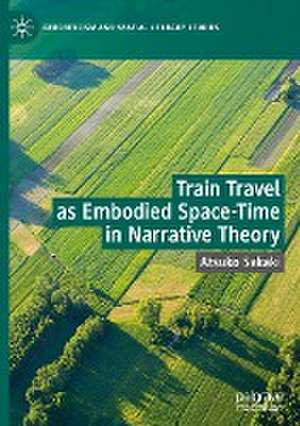Train Travel as Embodied Space-Time in Narrative Theory: Geocriticism and Spatial Literary Studies
Autor Atsuko Sakakien Limba Engleză Hardback – 2 noi 2023
Din seria Geocriticism and Spatial Literary Studies
- 20%
 Preț: 628.30 lei
Preț: 628.30 lei - 9%
 Preț: 764.94 lei
Preț: 764.94 lei - 18%
 Preț: 783.05 lei
Preț: 783.05 lei - 15%
 Preț: 696.50 lei
Preț: 696.50 lei - 18%
 Preț: 787.29 lei
Preț: 787.29 lei -
 Preț: 489.48 lei
Preț: 489.48 lei - 9%
 Preț: 635.07 lei
Preț: 635.07 lei -
 Preț: 215.71 lei
Preț: 215.71 lei - 15%
 Preț: 465.66 lei
Preț: 465.66 lei -
 Preț: 390.84 lei
Preț: 390.84 lei - 15%
 Preț: 470.06 lei
Preț: 470.06 lei - 15%
 Preț: 471.03 lei
Preț: 471.03 lei - 15%
 Preț: 701.90 lei
Preț: 701.90 lei - 18%
 Preț: 736.16 lei
Preț: 736.16 lei - 15%
 Preț: 581.98 lei
Preț: 581.98 lei -
 Preț: 382.36 lei
Preț: 382.36 lei -
 Preț: 479.47 lei
Preț: 479.47 lei -
 Preț: 390.84 lei
Preț: 390.84 lei - 15%
 Preț: 694.83 lei
Preț: 694.83 lei -
 Preț: 387.75 lei
Preț: 387.75 lei -
 Preț: 386.81 lei
Preț: 386.81 lei - 15%
 Preț: 642.51 lei
Preț: 642.51 lei - 15%
 Preț: 642.03 lei
Preț: 642.03 lei - 15%
 Preț: 692.41 lei
Preț: 692.41 lei - 15%
 Preț: 495.33 lei
Preț: 495.33 lei -
 Preț: 388.72 lei
Preț: 388.72 lei -
 Preț: 385.62 lei
Preț: 385.62 lei - 15%
 Preț: 694.87 lei
Preț: 694.87 lei - 15%
 Preț: 529.60 lei
Preț: 529.60 lei -
 Preț: 389.70 lei
Preț: 389.70 lei -
 Preț: 453.60 lei
Preț: 453.60 lei -
 Preț: 386.81 lei
Preț: 386.81 lei - 15%
 Preț: 700.29 lei
Preț: 700.29 lei
Preț: 730.02 lei
Preț vechi: 890.27 lei
-18% Nou
Puncte Express: 1095
Preț estimativ în valută:
139.71€ • 151.70$ • 117.35£
139.71€ • 151.70$ • 117.35£
Carte tipărită la comandă
Livrare economică 23 aprilie-07 mai
Preluare comenzi: 021 569.72.76
Specificații
ISBN-13: 9783031405471
ISBN-10: 3031405471
Ilustrații: XVI, 286 p.
Dimensiuni: 148 x 210 mm
Greutate: 0.51 kg
Ediția:1st ed. 2023
Editura: Springer Nature Switzerland
Colecția Palgrave Macmillan
Seria Geocriticism and Spatial Literary Studies
Locul publicării:Cham, Switzerland
ISBN-10: 3031405471
Ilustrații: XVI, 286 p.
Dimensiuni: 148 x 210 mm
Greutate: 0.51 kg
Ediția:1st ed. 2023
Editura: Springer Nature Switzerland
Colecția Palgrave Macmillan
Seria Geocriticism and Spatial Literary Studies
Locul publicării:Cham, Switzerland
Cuprins
Introduction: The Train as Embodied Space-Time, with Case Studies of The Lady Vanishes, The Narrow Margin, and Night Train Traveling Alone on the Rails into the Future: Sanshirō, My Most Secret Council, Night Train to Lisbon, and Zone Juncture 1: Wendy and Lucy Best Friends for a While: Fugitives on the Train in “Night of the Milky Way Railway,” Night Passage, and The Naked Eye Juncture 2: Clouds of Sils Maria It’s Not “I,” It’s “You”: A Second-Person Protagonist on the Train in La Modification, Blue Journey, and Suspects on the Night Train Conclusion: Stations as an Extension of the Train Space-Time in the Romantic Narrative “North Station”
Notă biografică
Atsuko Sakaki is Professor of East Asian studies and Comparative Literature at University of Toronto, Canada. She is the author of many articles and three books, including Recontextualizing Texts: Narrative Performance in Modern Japanese Fiction (Harvard, 1999) and The Rhetoric of Photography in Modern Japanese Literature (Brill 2015).
Textul de pe ultima copertă
Train Travel as Embodied Space-Time in Narrative Theory argues that the train is a loaded trope for reconfiguring narrative theories past their “spatial turn.” Atsuko Sakaki’s method exploits intensive and rigorous close reading of literary and cinematic narratives on one hand, and on the other hand interdisciplinary perspectives that draw out larger connections to narrative theory. The book utilizes not only narratological frameworks but also concepts of space-focused humanity oriented social sciences, such as human geography, mobility studies, tourism studies, and qualitative/experience-based ethnography, in their post “narrative turn.” On this interface of narrative studies and spatial studies, this book pays concerted attention to the formation of affordances, or relations in which the human subject uses a space-time and things in it, in terms of passenger experience of the train carriage and its extension.
Atsuko Sakaki is Professor of East Asian studies and Comparative Literature at University of Toronto, Canada. She is the author of many articles and three books, including Recontextualizing Texts: Narrative Performance in Modern Japanese Fiction (Harvard 1999) and The Rhetoric of Photography in Modern Japanese Literature (Brill 2015).
”Atsuko Sakaki keeps us on our toes with her consistent deconstructions of central conceptualizations and, drawing on a wealth of philosophical and theoretical texts, in language as clear as it is sensual, brings us to new insights into human modes of being and ontologies.” Irmela Hijiya-Kirschnereit, Freie Universität Berlin, Germany “In this intricate study of the entanglement of trains and narratives, Sakaki transforms our understanding of both. Train Travel uncovers a radically different experience of trains and narratives: they do not merely travel from one place to another; they construct passage as such, an experience of mutual entrainment.” Thomas Lamarre, University of Chicago
Caracteristici
Argues that the train is a loaded trope for reconfiguring narrative theories past their “spatial turn” Exploits literary and cinematic narratives and interdisciplinary perspectives to draw connections to narrative Pays attention to the formation of affordances in terms of passenger experience of the train carriage
